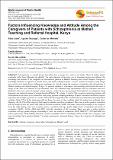Factors Influencing Knowledge and Attitude Among the Caregivers of Patients with Schizophrenia at Mathari Teaching and Referral Hospital, Kenya
Publication Date
2020Author
Edna Anab, Agatha Christine Onyango, Catherine Mwenda
Metadata
Show full item recordAbstract/
Schizophrenia is a mental disease that affects how a person feels, behaves and thinks. About 51 million people
worldwide suffer from Schizophrenia globally. The main objective of the study was to determine factors that influence the
knowledge and attitude of the caregivers of schizophrenic patients at Mathari Teaching and referral Hospital. Caregiver’s
knowledge facilitates recognition of mental illness and health-seeking behavior. A cross- sectional descriptive study design
was carried out to assess factors influencing knowledge and attitude among the caregivers of patients with schizophrenia at
Mathari teaching and referral hospital, Kenya. To generate qualitative information, on knowledge and attitude the nurse in
charge of the ward was selected as key informants. Data was collected using questionnaire and key informant interview.
Qualitative data were analyzed through content analysis, similar themes were grouped. Schizophrenia was diagnosed using
diagnostic and statistical manual of mental disorder (DSM-V-TR) criteria. A total of 303 caregivers visiting the patients with
schizophrenia in the wards were selected for study using systemic sampling technique. Pearson correlation coefficient, logistic
regression and multiple regression was used to determine the magnitude of the correlation between dependent and independent
variables. Most (72%) of the participants did not know the name of the condition which the patient was suffering from.
Majority, 164 (54.1%) of the caregivers had a positive attitude towards schizophrenia. There was a perfect positive correlation
with the length of time the patient had suffered from the condition (.08423 zero order) with the knowledge of the caregiver.
From the study finding, there was a perfect positive correlation with age, gender, highest level of education and nature of
occupation (.06543, .04186, .0088 and .0039) with the knowledge of the caregiver. There was also a perfect positive
correlation with age, gender religion, relationship to client, and nature of occupation (.0054, .0009.0357, .0574 and 0068 zero
orders respectively). Study findings indicated a positive correlation between knowledge and the attitude since a caregiver with
more knowledge had a positive attitude. The study recommends, treatment literacy classes for caregivers of schizophrenia
patients.

